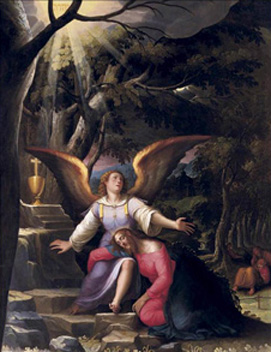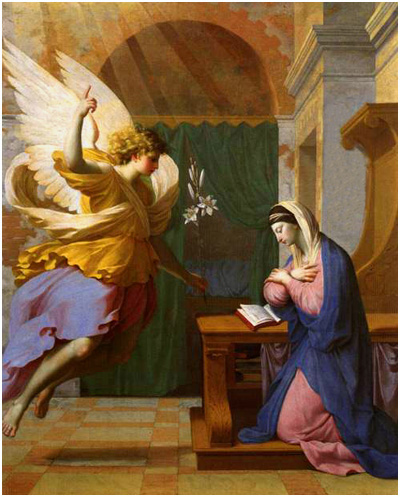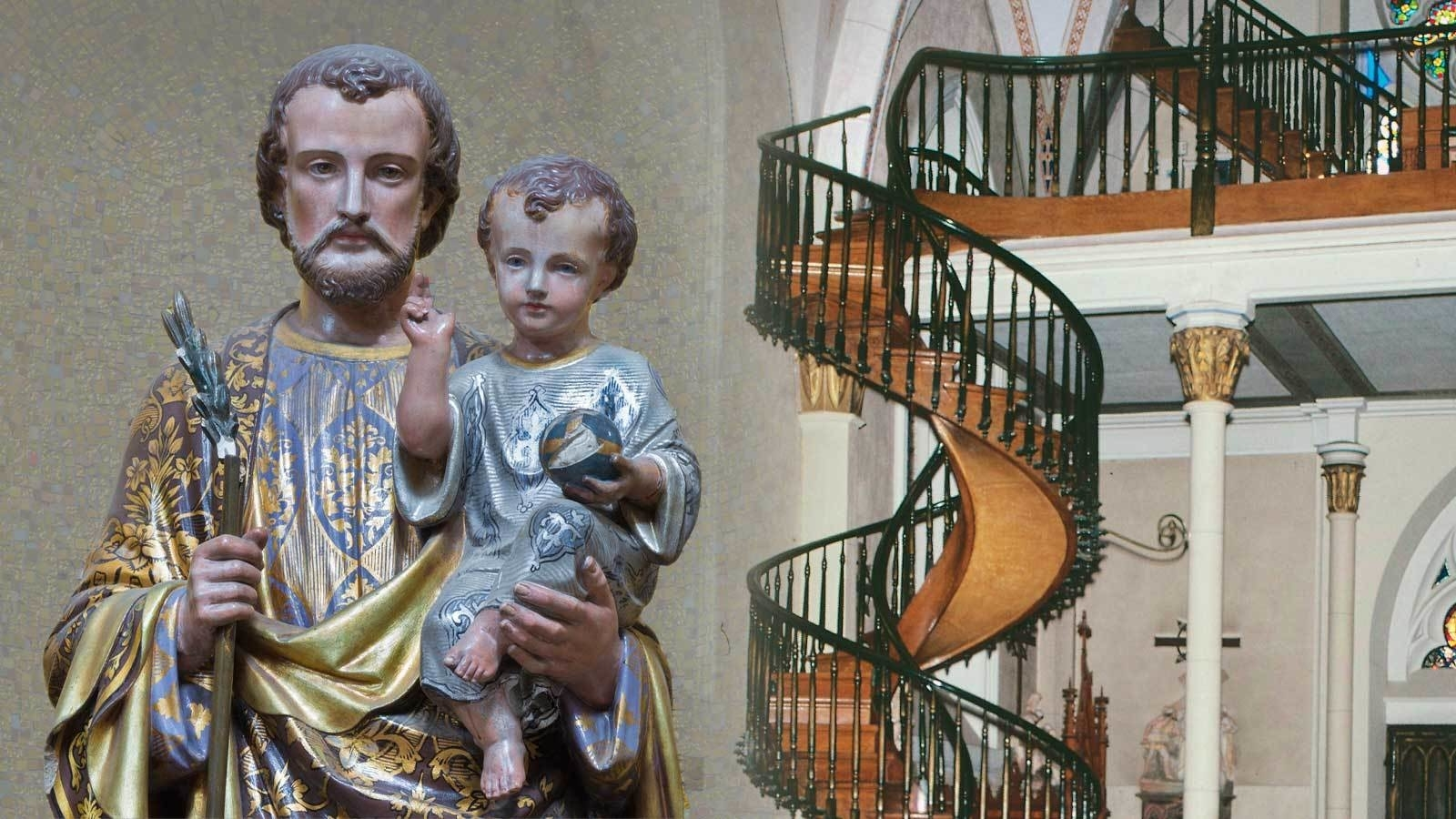This is a great day, not only to man, but even to God himself; for it is the anniversary of the most solemn event that time has ever witnessed. On this day, the Divine Word, by which the Father created the world, made made flesh in the womb of a Virgin, and dwelt among us. We must spend it in joy. While we adore the Son of God who humbled himself by thus becoming Man, let us give thanks to the Father, who so loved the world, as to give his Only Begotten Son; let us give thanks to the Holy Ghost, whose almighty power achieves the great mystery. We are in the very midst of Lent, and yet the ineffable joys of Christmas are upon us: our Emmanuel is conceived on this day, and nine months hence, will be born in Bethlehem, and the Angels will invite us to come and honor the sweet Babe.
During Septuagesima Week, we meditated upon the fall of our First Parents, and the triple sentence pronounced by God against the serpent, the woman, and Adam. Our hearts were filled with fear as we reflected on the divine malediction, the effects of which are to be felt by all generations, even to the end of the world. But, in the midst of the anathemas then pronounced against us, there was a promise made us by our God; it was a promise of salvation, and it enkindled hope within us. In pronouncing sentence against the serpent, God said, that his head should one day be crushed, and that, too, by a Woman.
The time has come for the fulfillment of this promise. The world has been in expectation for four thousand years; and the hope of its deliverance has been kept up, in spite of ail its crimes. During this time, God has made use of miracles, prophecies, and types, as a renewal of the engagement he has entered into with mankind. The blood of the Messias has passed from Adam to Noah; from Shem to Abraham, Isaac and Jacob; from David and Solomon to Joachim; and now it flows in the veins of Mary, Joachim’s Daughter. Mary is the Woman by whom is to be taken from our race the curse that lies upon it. God has decreed that she should be Immaculate; and, thereby, has set an irreconcilable enmity between her and the serpent. She, a daughter of Eve, is to repair all the injury done by her Mother’s fall; she is to raise up her sex from, the degradation into which it has been cast; she is to co-operate, directly and really, in the victory which the Son of God is about to gain over his and our enemy.
A tradition, which has come down from the Apostolic Ages, tell us that the great Mystery of the Incarnation was achieved on the twenty-fifth day of March. It was at the hour of midnight, when the most Holy Virgin was alone and absorbed in prayer, that the Archangel Gabriel appeared before her, and asked her, in the name of the Blessed Trinity, to consent to become the mother of God. Let us assist, in spirit, at this wonderful interview between the Angel and the Virgin: and at the same time, let us think of that other interview, which took place between Eve and the serpent. A holy Bishop and Martyr of the 2nd century, Saint Ireneus—who had received the tradition from the very disciples of the Apostles—shows us that Nazareth is the counterpart of Eden.
In the garden of delights, there is a virgin and an angel; and a conversation takes place between them. At Nazareth, a virgin is also spoken to by an angel, and she answers him; but the angel of the earthly Paradise is a spirit of darkness, and he of Nazareth is a spirit of light. In both instances, it is the Angel that has the first word. Why, said the serpent to Eve, why hath God commanded you, that you should not eat of every tree of Paradise? His question implies impatience and a solicitation to evil; he has contempt for the frail creature to whom he addresses it, but he hates the image of God which is upon her.
See, on the other hand, the Angel of light; see with what composure and peacefulness he approaches the Virgin of Nazareth, the new Eve; and how respectfully he bows himself down before her: Hail full of grace! The Lord is with thee! Blessed art thou among women! Such language is evidently of heaven: none but an Angel could speak thus to Mary.
Eve imprudently listens to the tempter’s words; she answers him; she enters into conversation with one that dares to ask her to question the justice of God’s commands. Her curiosity urges her on. She has no mistrust in the serpent; this leads her to mistrust her Creator.
Mary hears what Gabriel has spoken to her; but this Most Prudent Virgin is silent. She is surprised at the praise given her by the Angel. The purest and humblest of Virgins has a dread of flattery; and the heavenly Messenger can get no reply from her until he has fully explained his mission by these words: Fear not, Mary, for thou hast found grace with God. Behold, thou shalt conceive in thy womb, and shalt bring forth a Son: and thou shalt call his name Jesus. He shall be great, and shall be called the Son of the Most High, and the Lord God shall give unto him the throne of David his father: and he shall reign in the house of Jacob forever, and of his kingdom there shall be no end.
What magnificent promises are these which are made to her in the name of God! What higher glory could she, a daughter of Juda, desire? knowing too, as she does, that the fortunate Mother of the Messias is to be the object of the greatest veneration! And yet it tempts her not. She has forever consecrated her virginity to God, in order that she may be the more closely united to him by love. The grandest possible privilege, if it is to be on the condition of her violating this sacred vow, would be less than nothing in her estimation. She thus answers the Angel: How shall this be done? because I know not man.
The first Eve evinces no such prudence or disinterestedness. No sooner has the wicked spirit assured her that she may break the commandment of her divine benefactor and not die; that the fruit of her disobedience will be a wonderful knowledge, which will put her on an equality with God himself—than she immediately yields; she is conquered. Her self-love has made her at once forget both duty and gratitude: she is delighted at the thought of being freed from the two-fold tie, which binds her to her Creator.
Such is the woman that caused our perdition! But how different is she that was to save us! The former cares not for her posterity; she looks but to her own interests: the latter forgets herself to think only of her God, and of the claims he has to her service. The Angel, charmed with this sublime fidelity, thus answers the question put to him by Mary, and reveals to her the designs of God: The Holy Ghost shall come upon thee, and the power of the Most High shall overshadow thee. And therefore also the Holy which shall be born of thee, shall be called the Son of God. And behold thy cousin Elizabeth, she also hath conceived a son in her old age; and this is the sixth month with her that is called barren; because no word shall be impossible with God. This said, he is silent, and reverently awaits the answer of the Virgin of Nazareth.
Let us look once more at the virgin of Eden. Scarcely has the wicked spirit finished speaking than Eve casts a longing look at the forbidden fruit: she is impatient to enjoy the independence it is to bring her. She rashly stretches forth her hand; she plucks the fruit; she eats it, and death takes possession of her: death of the soul, for sin extinguishes the light of life; and death of the body, which, being separated from the source of immortality, becomes an object of shame and horror, and finally crumbles into dust.
But let us turn away our eyes from this sad spectacle, and fix them on Nazareth. Mary has heard the Angel’s explanation of the mystery; the will of heaven is made known to her, and how grand an honor it is to bring upon her! She, the humble maid of Nazareth, is to have the ineffable happiness of becoming the Mother of God, and yet the treasure of her Virginity is to be left to her! Mary bows down before this sovereign will, and says to the heavenly Messenger: Behold the handmaid of the Lord: be it done to me according to thy word.
Thus, as the great St. Ireneus and so many of the Holy Fathers remark, the obedience of the second Eve repaired the disobedience of the first: for no sooner does the Virgin of Nazareth speak her fiat—be it done—than the Eternal Son of God (who, according to the divine decree, awaited this word) is present, by the operation of the Holy Ghost, in the chaste womb of Mary, and there he begins his human life. A Virgin is a mother, and Mother of God; and it is this Virgin’s consenting to the divine will that has made her conceive by the power of the Holy Ghost. This sublime Mystery puts between the Eternal Word and a mere woman the relations of Son and Mother; it gives to the Almighty God a means whereby he may, in a manner worthy of his Majesty, triumph over Satan, who had hitherto seemed to have prevailed against the divine plan.
Never was there a more entire or humiliating defeat, than that which was this day gained over Satan. The frail creature, over whom he had so easily triumphed at the beginning of the world, now rises and crushes his proud head. Eve conquers in Mary. God would not choose man for the instrument of his vengeance; the humiliation of Satan would not have been great enough; and therefore she who was the first prey of hell, the first victim of the tempter, is selected as the one that is to give battle to the enemy. The result of so glorious a triumph is that Mary is to be superior not only to the rebel angels, but to the whole human race, yea, to all the Angels of heaven. Seated on her exalted throne, she, the Mother of God, is to be the Queen of all creation. Satan, in the depths of the abyss, will eternally bewail his having dared to direct his first attack against the woman, for God has now so gloriously avenged her; and in heaven, the very Cherubim and Seraphim reverently look up to Mary, and deem themselves honored when she smiles upon them, or employs them in the execution of any of her wishes, for she is the Mother of their God.
Therefore is it that we the children of Adam, who have been snatched by Mary’s obedience from the power of hell, solemnize this day of the Annunciation. Well may we say of Mary those words of Debbora, when she sang her song of victory over the enemies of God’s people: The valiant men ceased, and rested in Israel, until Debbora arose, a Mother arose in Israel. The Lord chose new wars, and he himself overthrew the gates of the enemies. Let us also refer to the holy Mother of Jesus these words of Judith, who, by her victory over the enemy, was another type of Mary: Praise ye the Lord our God, who hath not forsaken them that hope in him. And by me, his handmaid, he hath fulfilled his mercy, which he promised to the house of Israel; and he hath killed the enemy of his people by my hand this night … The Almighty Lord hath struck him, and hath delivered him into the hands of a woman, and hath slain him.
FIRST VESPERS
When the Annunciation falls on any other day than Monday, the First Vespers of this Feast are sung before mid-day, according to the rule prescribed for Fast-days of Lent: but when it falls on a Monday, this Office is celebrated at the ordinary time of Vespers, and only a commemoration is made of the Sunday by the Magnificat Antiphon and the Prayer.
The Office of First Vespers is always the commencement of a Feast. The Antiphons of the Vespers, at which we are going to assist, are taken from the Gospel of St. Luke, where the Evangelist reveals to us the sublime interview between the angel and the Virgin. The psalms are those which tradition has consecrated to the celebration of Mary’s glories. We have elsewhere (Dec. 8 – Advent Vespers) shown how each of the five refers to the Mother of God.
ANT. The Angel Gabriel was sent to Mary, a Virgin, espoused to Joseph.
The Lord said to my Lord, his Son: Sit thou at my right hand, and reign with me.
Until, on the day of thy last coming, I make thy enemies thy footstool.
O Christ! the Lord thy Father, will send forth the scepter of thy power out of Sion: from thence rule thou in the midst of thy enemies.
With thee is the principality in the day of thy strength, in the brightness of the Saints: for the Father hath said to thee: From the womb, before the day-star, I begot thee.
The Lord hath sworn, and he will not repent: he hath said, speaking of thee, the God-Man: Thou art a Priest forever, according to the order of Melchisedech.
Therefore, Father, the Lord, thy Son, is at thy right hand: he hath broken kings in the clay of his wrath.
He shall also judge among nations, he shall fill the ruins of the world: he shall crush the heads in the land of many.
He cometh now in humility: he shall drink, in the way, of the torrent of sufferings: therefore, shall he lift up the head.
ANT. The Angel Gabriel was sent to Mary, a Virgin, espoused to Joseph.
ANT. Hail, Mary, full of grace, the Lord is with thee: Blessed art thou among women.
Reading of PSALM 112
ANT. Hail, Mary, full of grace, the Lord is with thee: Blessed art thou among women.
ANT. Fear not, Mary; thou hast found grace with God: behold thou shalt conceive, and shalt bring forth a Son.
Reading of PSALM 121
ANT. Fear not, Mary, for thou hast found grace with God: behold thou shalt conceive, and shalt bring forth a Son.
ANT. And the Lord shall give unto him the throne of David his father, and he shall reign forever.
Reading of PSALM 126
ANT. And the Lord shall give unto him the throne of David his father, and he shall reign forever.
ANT. Behold the handmaid of the Lord: be it done to me according to thy word.
Reading of PSALM 147
ANT. Behold the handmaid of the Lord: be it done to me according to thy word.
CAPITULUM (Is. VII.)
Behold a Virgin shall conceive, and bear a Son, and his name shall be called Emmanuel. He shall eat butter and honey, that he may know to refuse the evil, and to choose the good.
HYMN – Ave, Maris Stella
Hail, Star of the Sea! Blessed Mother of God, yet ever a Virgin! O happy gate of heaven!
Thou that didst receive the Ave from Gabriel’s lips, confirm us in peace, and so let Eva be changed into an Ave of blessing for us.
Loose the sinner’s chains, bring light to the blind, drive from us our evils, and ask all good things for us.
Show thyself a Mother, and offer our prayers to Him, who would be born of thee, when born for us.
O incomparable Virgin, and meekest of the meek, obtain us the forgiveness of our sins, and make us meek and chaste.
Obtain us purity of life, and a safe pilgrimage; that we may be united with thee in the blissful vision of Jesus.
Praise be to God the Father, and to the Lord Jesus, and to the Holy Ghost: to the Three one self-same praise. Amen.
℣. Hail, Mary, full of grace.
℟. The Lord is with thee.
ANTIPHON OF THE MAGNIFICAT
The Holy Ghost shall come upon thee, O Mary, and the power of the Most High shall overshadow thee.
LET US PRAY
O God, who wast pleased that thy Word, when the angel delivered his message, should take flesh in the womb of the Blessed Virgin Mary, give ear to our humble petitions, and grant, that we who believe her to be truly the Mother of God, may be helped by her prayers. Through the same, etc.
Mass.—The Church has taken most of the chants of today’s Mass from the Forty-fourth Psalm, wherein the Royal Prophet celebrates the mystery of the Incarnation. In the Introit, she greets Mary as the Queen of the human race, to whom every creature should pay respectful homage. It was her Virginity that fitted Mary to become the Mother of God. This virtue will be imitated in the Church, and each generation will produce thousands of holy Virgins, who will walk in the footsteps of her that is their Mother and their model.

















